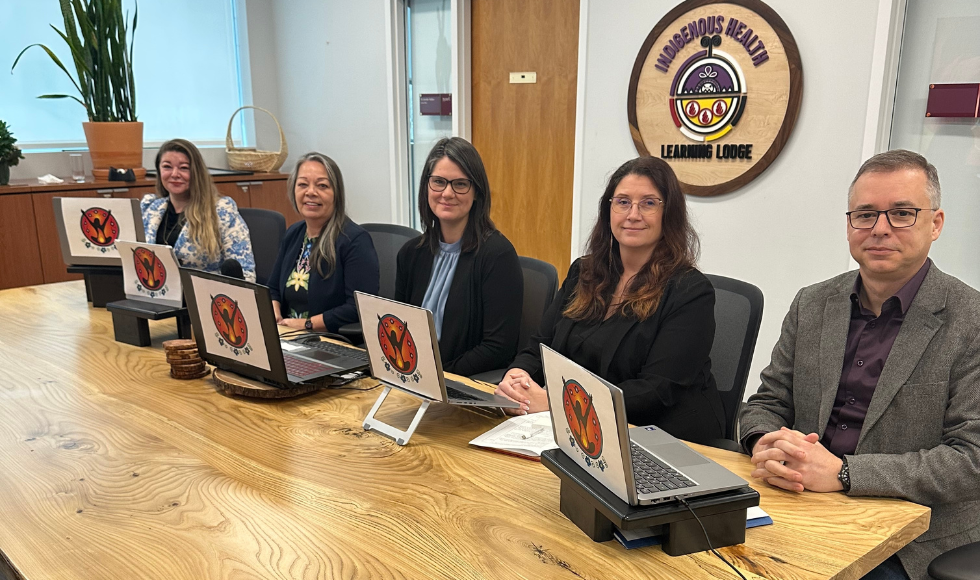Indigenous-led team secures $24M for transformative brain health research

From left, researchers Megan O’Connell from the University of Saskatchewan; Edith Mercieca from Maamwesying North Shore Community Health Services; Jennifer Walker from McMaster University; Pamela Roach from the University of Calgary; and Roger Pilon from Queen's University are part of a team of community-based and university researchers developing a bundle of dementia assessment tools that will be culturally safe, trauma-informed, and tailored to the unique needs of Indigenous communities.
BY Adam Ward, Faculty of Health Sciences
April 8, 2025
An Indigenous-led group of university and community-based researchers have been awarded $24 million in funding to transform brain health and develop a bundle of dementia assessment tools that will benefit Indigenous groups across Canada and internationally.
The bundle of assessment tools, funded through the New Frontiers in Research Fund Transformation Stream Competition, will be developed over the next six years and include validated instruments for assessing dementia, and may also consider depression, cognition, function, and quality of life. These tools will be culturally safe, trauma-informed, and tailored to the unique needs of Indigenous communities.
The Landmark Study released by the Alzheimer Society of Canada in 2024 estimated that by 2050, the number of people with Indigenous ancestry living with Alzheimer’s disease will increase by 273 per cent.
This is significantly higher than the 187 per cent increase the report estimates for the overall population in Canada.
“Brain health assessment, particularly cognitive assessment, is challenging for people. For Indigenous people, there are added barriers and layers, like the history of racism in health care and colonization,” says principal investigator Jennifer Walker, an associate professor with McMaster University’s Department of Health Research Methods, Evidence, and Impact.
“We want to transform these assessments for the better.”
The project will provide training materials and implementation guidance to ensure these tools can be effectively integrated into community health practices and electronic medical records.
“This work is rooted in the strength and knowledge of our Elders, ensuring that research serves our people in meaningful ways. By building upon the foundational work already happening within our Indigenous communities, we are not just developing tools — we are reclaiming our ways of knowing and embedding them into systems that will support the health and well-being of future generations,” says Edith Mercieca, co-principal investigator, Anishnawbe-kwe from the Sagamok Anishnawbek First Nation, and director of Home and Community Support Services for Maamwesying North Shore Community Health Services.
To ensure these tools are culturally informed, Walker — a Haudenosaunee woman — and her team have partnered with Dilico Anishinabek Family Care, Maamwesying North Shore Community Health Services, Manotsaywin Nanotoojig Inc, Métis Nation of Alberta, Six Nations of the Grand River and the Two-Spirit Program at the Community-Based Research Centre.
Researchers with Lakehead University, Laurentian University, Queen’s University, University of Calgary, University of Saskatchewan and Western University, as well as KITE Research Institute at University Health Network, will also play crucial roles in the development of the tools.
“The diversity of these groups is really important to the project and they bring diverse Indigenous perspectives and are complimented by the strength of the academic researchers working in these communities,” says Walker.
One of the many strengths of the research group comes from the inclusion of the Indigenous members who have experienced firsthand the direct impacts of dementia. One of those members is Elizabeth Webkamigad, whose mother lives with dementia.
“Having people with lived experience share their scenarios and stories can help these professionals, researchers and other people contribute to this bundle,” Webkamigad says.
“Our experiences can help make things more understandable; make things not as lonely, not as scary and not as unimaginable as they were, because that’s exactly what it was for me.”
The project will span six years, with various milestones along the way:
- Year one: Build relationships, community protocols, ceremony
- Year two: Components of a holistic brain health assessment
- Year three: Clarity on constructs from community perspectives
- Year four: Piloting and content validity for assessments
- Year five: Reliability and validity testing in community sites
- Year six: Returning the bundle and sharing it
Dementia is an umbrella term for several diseases that affect memory, thinking, and the ability to perform daily activities.
The most common form of dementia is Alzheimer’s disease, which accounts for approximately 60 to 70 per cent of cases, according to the Public Health Agency of Canada. Other forms include Vascular dementia, Lewy Body disease and mixed dementia.


